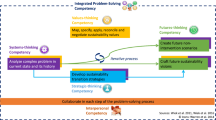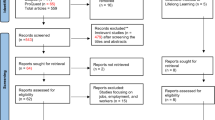Abstract
Universities want to prepare students intellectually so that they might eventually find successful, fulfilling work. Since work is synonymous with business – no work ever exists outside of business – one of the academy's primary goals is to help students enter the world of business, regardless of their majors. Many universities also declare within their mission statements a desire to cultivate a student body capable of making ethically informed decisions. Consequently we might conceptualize "business ethics" as not simply one field within the academic constellation, but rather the conceptual glue holding together the curriculum. And since the most significant new development in business within the past decade is arguably the emergence of theories of sustainable business practice, we would do well to consider the role business ethics can play in the creation of a new "sustainable curriculum."
Similar content being viewed by others
References
Blitz, Michael and C. Mark Hurlbert: 1998, Letters for the Living: Teaching Writing in a Violent Age (NCTE, Urbana, IL).
Brock-Utne, Birgit: 1985, Educating for Peace: A Feminist Perspective (Pergamon Press, NY).
Durning, Alan Thein: 1992, How Much Is Enough? The Consumer Society and the Future of the Earth (WW Norton, NY).
Engel, Ronald and Joan Gibb Engel (eds.): 1993, Ethics of Environment and Development: Global Challenge, International Response (University of Arizona Press, Tucson).
Frank, Robert H. and Philip J. Cook: 1995, The Winner-Take-All Society (The Free Press, NY).
Freed, Richard D. (ed.): 1996, Eloquent Dissent: The Writings of James Sledd (Boynton/Cook Heinemann, Portsmouth, NH).
Gabelnick, Faith, Jean MacGregor, Roberta S. Matthews and Barbara Leigh Smith: 1990, Learning Communities: Creating Connections Among Students, Faculty, and Disciplines (Jossey-Bass, San Francisco).
Garbarino, James: 1992, Toward a Sustainable Society: An Economic, Social and Environmental Agenda for Our Children's Future (Noble Press, Chicago).
Hawken, Paul: 1993, The Ecology of Commerce: A Declaration of Sustainability (HarperBusiness, NY).
Illich, Ivan: 1970, Deschooling Society (Harper & Row, NY).
Johnson, Kirk: 1996 (Feb 14), ‘Report Warns that New York Area Could Decline’, New York Times, A1, B5.
MacGregor, John M.: ‘I See a World within the World: I Dream but Am Awake’, in Maurice Tuchyman and Carol S. Eliel (eds.), with Barbara Freeman, Parallel Visions: Modern Artists and Outsider Art, 246–279.
Morrill, Richard L.: 1980, Teaching Values in College (Jossey-Bass, San Francisco).
O'Reilley, Mary Rose: 1993, The Peaceable Classroom (Boynton/Cook Heinemann, Portsmouth, NH).
Orr, David W.: 1992, Ecological Literacy: Education and the Transition to a Postmodern World (SUNY Press, Albany).
Schwartz, Peter: 1991, The Art of the Long View (Currency, NY).
Stimpson, Catherine R.: 1996, ‘The Public Duties of Our Profession’, Profession (MLA, NY), pp. 100–102.
Trainer, Ted: 1995, The Conserver Society: Alternatives for Sustainability (Zed Books, London).
Rights and permissions
About this article
Cite this article
Owens, D. From the Business Ethics Course to the Sustainable Curriculum. Journal of Business Ethics 17, 1765–1777 (1998). https://doi.org/10.1023/A:1006000409461
Issue Date:
DOI: https://doi.org/10.1023/A:1006000409461




